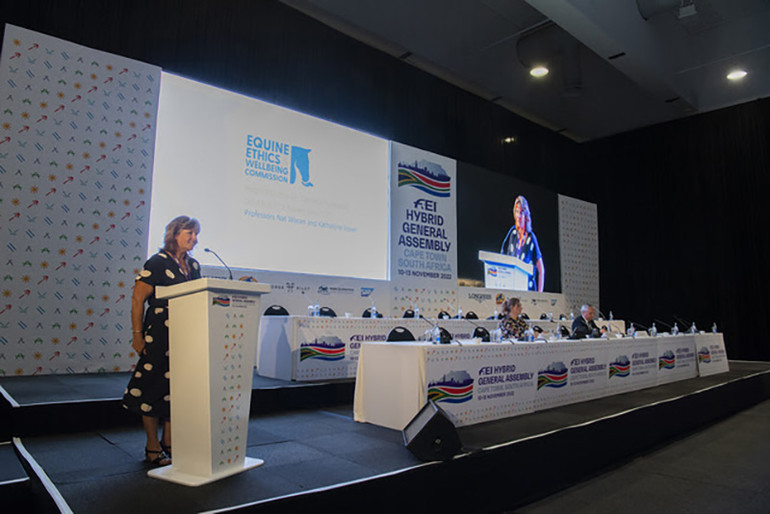Press release from FEI
In his opening to the first Session of the day on the Equine Ethics and Wellbeing Commission (EEWB), FEI President Ingmar De Vos said “Today’s session is part of a process. It’s an important marker in the Equine Ethics and Wellbeing Commission’s overall framework, and this is why it is important that you are present here (and online) because we need all of you to really make it count. There is more that can be done, and more that must be done when it comes to protecting the welfare of the horse.”
He went on to say, “We need to reconfirm and strengthen the position of equestrian sport in modern society. And to do this, we need to have the courage to look in the mirror and accept not only what we see, but also what the general public sees, unbiased without any filters.”
The independent EEWB Commission was created in June 2022 to focus on ways that the FEI equestrian community can strengthen its social licence to operate in light of growing public concern related to the welfare and wellbeing of horses in sport.
Chair of the Commission and internationally recognised animal behaviour and welfare scientist Professor Dr. Natalie Waran took the floor to provide delegates with a general overview of different aspects of social license to operate. She then outlined different aspects of the Commission work, in particular the approach that is being taken by the Commission to analyse the different aspects of equine welfare that can affect social license to operate in the context of the FEI’s activities, with the ultimate goal of recommending a practical course of action.
“We are all equestrian stakeholders,” Dr. Waran said in her address to the General Assembly. “As the Commission, we will be blunt, we will be direct and we will tell you the truth. But in the end we will be here with you. There is change that needs to happen and we are here to develop a strategy, provide objective advice, make recommendations and then see how these recommendations can be put into operation.”
As part of an evidence based approach to their work, the Commission carried out two surveys of equestrian stakeholders and the general public in order to determine the wide spread perception of the use of horses in sport. Fellow expert and Commission member Professor Kathalijne Visser then took delegates through the analysis of the data from these two surveys.
In the third and final part of the presentation, Dr. Waran provided an initial structure of an Equine Ethics and Wellbeing Strategy to address Social License to Operate issues which is based on six main support pillars:
- Evidence: to improve credibility through being research-led
- Education: Promoting effective knowledge transfer to ensure optimised standards of equine well-being
- Engagement: Requiring transparency, through clear and timely communication
- Effective Regulation: Safe-guarding equine welfare especially where there may be competing agendas.
- Enforcement: Ensuring clear understanding of the rules and effective compliance by all involved with sports horses
- Empowerment: Promoting a culture of personal responsibility for equine welfare and wellbeing
There was wide spread agreement that horse welfare and strong scientific research should be the basis on which the community takes decisions regarding equine wellbeing practice.
The Q&A session generated open discussions between members of the Commission and delegates in attendance and online. There were a broad range of subjects that were considered including the early recommendations provided by the Commission on double bridles and bits, ways to communicate to improve the image of the sport and horse activities more generally, the methodology behind the surveys and other research carried out by the Commission, and matters relating to measuring the emotions of horses, and the direct and indirect influence of the FEI even outside the sports area.
After the discussion on the EEWB Commission, the Sessions then moved on to clarifications on the proposed modifications to the General Regulations and Calendar related proposals, Discipline Rules, Veterinary Regulations and the Paris 2024 Rules. The Dressage, Para Dressage, Eventing and Veterinary Rules went through a full revision this year.
The Sessions provided National Federations with a final opportunity to discuss the proposals that will be put forward to the FEI Hybrid General Assembly. Delegates will be required to vote to approve General and Discipline specific Rules and Regulations.
The FEI Hybrid General Assembly commences at 09:00 CET and will be available to watch on livestream here. All proposed Rules amendments will be voted on at the FEI Hybrid General Assembly on 13 November 2022 and updated on Inside.FEI.org here in due course.









